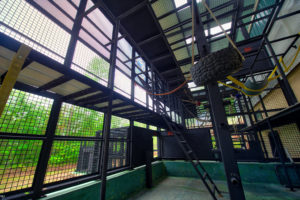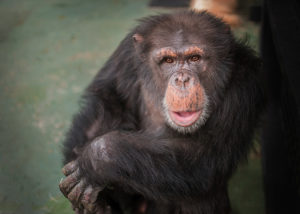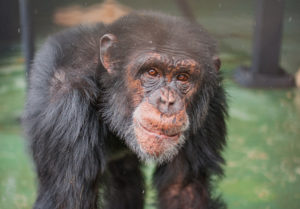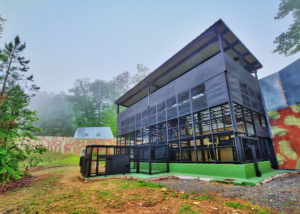
Two Well-Known Former Research Chimpanzees Relocated to Permanent Sanctuary
Morganton, GA (March 21) — Two well-known former research chimpanzees now have a forever home in the Blue Ridge Mountains, thanks to a cooperative agreement between the New Iberia Research Center in Louisiana and Project Chimps, a 236-acre sanctuary in north Georgia.
Eleven-year-old Hercules and Leo joined other retired chimpanzees at the forested Project Chimps sanctuary, where they will spend the remainder of their lives napping, foraging, and climbing pine trees.
The two nonhuman primates were used in noninvasive locomotion studies at a New York state facility, where they lived from 2010 to 2015. They gained news media attention when an animal rights organization filed a lawsuit seeking legal personhood for them. A New York judge dismissed that lawsuit in July 2015. They moved back to NIRC in December 2015 and were retired from research.
Hercules and Leo, and seven other male chimpanzees, made the 14-hour journey from NIRC to Project Chimps. They left Tuesday afternoon, arriving in Morganton, Georgia, as the sun rose Wednesday morning.
Other chimpanzees in the group are Kivuli, Oscar and Jacob, age 7; Danner, 8; Ray, 9; and Kennedy and Binah, 10. Members of this social group of chimpanzees are the youngest males to relocate from NIRC to Project Chimps since the sanctuary opened in September 2016.
“All chimpanzees at NIRC were retired from research in 2015. We’re pleased that Hercules, Leo and their social–group companions will continue their retirement at the Project Chimps sanctuary,” said Dr. Francois Villinger, NIRC director.
Hercules and Leo can be sponsored for a limited time. Donations in any amount will help to provide for the lifelong care of Hercules, Leo and other former research chimpanzees now in sanctuary.
Video: Watch as Hercules, Jacob, Binah, and Leo enter the open-air porch at Project Chimps. In this video, Kivuli, Leo, and Hercules meet two of their new caregivers, Tawnya and Kaitlyn.*
Chimpanzees can live more than 50 years in captivity. Together, NIRC and Project Chimps are working to relocate 220 chimpanzees to permanent sanctuary. To date, with the latest group of nine, 40 chimpanzees have been transferred to Project Chimps.

The open-air porch at Villa 2 connects with a 6-acre, outdoor forested habitat. Photo: Crystal Alba/Project Chimps
Project Chimps is a sanctuary and therefore not open to the public except for limited engagements. The next opportunity for members of the public to visit the sanctuary will be May 19-20 when Project Chimps hosts its first “Discovery Days” event, including free educational activities and ticketed tours of the sanctuary. More information is available on the Project Chimps Events page.
Corrections: The name Kenndie has been corrected to Kennedy. The age of Kennedy and Binah has been corrected to 10.
Project Chimps is the newest chimpanzee sanctuary in the United States and was founded specifically to provide lifetime care to former research chimpanzees at its forested sanctuary on 236 acres of forested land in the Southern Appalachian Mountains. Project Chimps is an accredited charity by the Better Business Bureau and has achieved Guidestar Platinum status; additionally accredited by the Global Federation of Animal Sanctuaries (GFAS) and a member of the North American Primate Sanctuary Alliance (NAPSA).
The University of Louisiana at Lafayette New Iberia Research Center specializes in the breeding, management, and importation of a diverse range of nonhuman primate species. It offers a broad range of diagnostic, laboratory, and human resources for the development and characterization of nonhuman primate models for applied and basic biomedical research that leads to advances in the health and well-being of humans and nonhuman primates.



